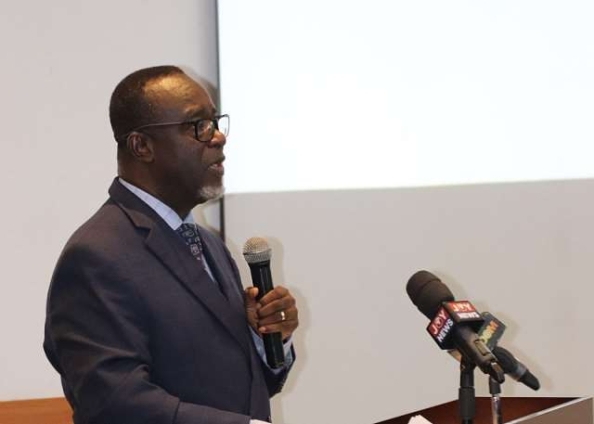The judiciary has recommended that the time limit for submitting parliamentary election petitions be reduced to seven days to allow for faster adjudication of cases.
It has also proposed that the petition be filed seven days after the election results are declared, rather than after they are published in the gazette.
Additionally, it suggested that C.I 47, the Civil Procedure law that regulates the adjudication of such matters, be repealed, or amended to enable cases to be heard within a month.
According to the Judiciary, if those statutory and procedural changes are implemented, the courts would be able to adjudicate parliamentary election issues on time before Members of Parliament are sworn in.
It would also allow the President to appoint his ministers from among members of parliament without having to worry about any litigation involving them.
Justice Paul Baffoe Bonnie, Justice of the Supreme Court and Chairman of the Election Management Committee presented the proposal on behalf of the Judiciary at a stakeholder engagement in Accra on Wednesday.
Participants included political parties, civil society organisations, Electoral Commission officers, and some legal practitioners.
Justice Yonney Kulendi, Justice of the Supreme Court of Ghana, Dr Bossman Eric Asare, Deputy Chair, Electoral Commission, Dr Ernest Adu-Gyamfi, Chairman, Board of National Peace Council, Dr Emmanuel Akwetey, Institute of Democratic Governance, Lawyer Godwin Edudzi Tamakloe, Head, National Democratic Congress Legal Affairs, and Lawyer Frank Davies were among those who took part in the meeting.
The meeting was organised by the National Peace Council.
Justice Baffoe Bonney said the proposal emanated from a request by electoral stakeholders to the judiciary to speed up adjudicating parliamentary election petitions.
He said the judiciary noted that statutory and procedural processes, institutional challenges, and judicial capacity all contribute to adjudication delays.
Justice Baffoe Bonney then outlined the procedural and statutory factors that cause petition processing delays.
He indicated that section 18 of the Representation of the People Law, 1992 (PNDCL 284) required that an election petition be presented within 21 days of publication in the gazette.
Justice Baffoe Bonney stated that since 1992, election results have been declared within 72 hours, and in the case of parliamentary elections, they are usually announced a few minutes after the voting process or within 48 hours.
He said that if the results are available in 72 hours, the law should be amended to allow a person to commence action seven days after the results are declared.
In addition, Justice Baffoe Bonney stated that the second part of Section 18, which states that a person can initiate a petition 21 days after publication in the gazette, should be amended.
He stated that after thorough evaluation, the Judiciary determined that election results take longer to be published in the Gazette, which further delays the hearing.
He recommended that once the results are announced, a person can act after seven days, regardless of whether the gazette was published.
Justice Baffoe Bonney also noted the application of C.I. 47 in election petitions as a cause of delay, often requiring three months before the actual hearing starts.
He consequently proposed that C.I 47 be repealed or amended, or that a new legislation be drafted to govern the parliamentary election trials.
Justice Baffoe Bonney stated that it would be in the best interests of all parties to examine those amendments because they would help both constituents and the President, who would need to elect some ministers from parliament.
“We vote for people to go to parliament to go and represent our interest, so it important that people are cleared to go and start work.
“By our constitution, the President has to appoint a certain number of parliamentarians as Minister…So the president must have the full complement of his MPs,” he said.
Dr. Ernest Adu- Gyamfi expressed gratitude to the Judiciary for their efforts.
He urged all stakeholders to consider the proposals and provide suggestions for improvements so that they may be used in future elections.
Latest Stories
-
Paris 2024: Opening ceremony showcases grandiose celebration of French culture and diversity
3 hours -
Spectacular photos from the Paris 2024 opening ceremony
4 hours -
How decline of Indian vultures led to 500,000 human deaths
4 hours -
Paris 2024: Ghana rocks ‘fabulous fugu’ at olympics opening ceremony
4 hours -
Trust Hospital faces financial strain with rising debt levels – Auditor-General’s report
5 hours -
Electrochem lease: Allocate portions of land to Songor people – Resident demand
5 hours -
82 widows receive financial aid from Chayil Foundation
5 hours -
The silent struggles: Female journalists grapple with Ghana’s high cost of living
5 hours -
BoG yet to make any payment to Service Ghana Auto Group
5 hours -
‘Crushed Young’: The Multimedia Group, JL Properties surprise accident victim’s family with fully-furnished apartment
6 hours -
Asante Kotoko needs structure that would outlive any administration – Opoku Nti
7 hours -
JoyNews exposé on Customs officials demanding bribes airs on July 29
7 hours -
JoyNews Impact Maker Awardee ships first consignment of honey from Kwahu Afram Plains
8 hours -
Joint committee under fire over report on salt mining lease granted Electrochem
8 hours -
Life Lounge with Edem Knight-Tay: Don’t be beaten the third time
8 hours

